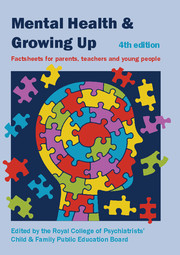Book contents
- Frontmatter
- Contents
- Contributors
- Factsheets for young people
- Factsheets for parents, carers and anyone who works with young people
- 1 Good parenting
- 2 The restless and excitable child
- 3 Dealing with tantrums
- 4 Children who soil or wet themselves
- 5 Sleep problems in childhood and adolescence
- 6 Behavioural problems and conduct disorder
- 7 Attention-deficit hyperactivity disorder (ADHD)
- 8 The child with general learning disability
- 9 Specific learning difficulties
- 10 Autism and Asperger syndrome
- 11 Depression in children
- 12 Worries and anxieties: helping children to cope
- 13 Divorce or separation of parents: the impact on children and adolescents
- 14 Death in the family: helping children to cope
- 15 The emotional cost of bullying
- 16 Traumatic stress in children
- 17 Domestic violence: its effects on children
- 18 Child abuse and neglect: the emotional effect
- 19 Drugs and alcohol: what parents need to know
- 20 Self-harm in young people
- 21 Psychosis
- 22 Schizophrenia
- 23 Bipolar disorder in children and adolescents
- 24 Obsessive–compulsive disorder in children and young people
- 25 Eating disorders in young people
- 26 Chronic physical illness: the effects on mental health
- 27 Medically unexplained physical symptoms
- 28 Chronic fatigue syndrome: helping your child get better
- 29 Parental mental illness: the problems for children
- 30 Who's who in CAMHS
6 - Behavioural problems and conduct disorder
from Factsheets for parents, carers and anyone who works with young people
Published online by Cambridge University Press: 02 January 2018
- Frontmatter
- Contents
- Contributors
- Factsheets for young people
- Factsheets for parents, carers and anyone who works with young people
- 1 Good parenting
- 2 The restless and excitable child
- 3 Dealing with tantrums
- 4 Children who soil or wet themselves
- 5 Sleep problems in childhood and adolescence
- 6 Behavioural problems and conduct disorder
- 7 Attention-deficit hyperactivity disorder (ADHD)
- 8 The child with general learning disability
- 9 Specific learning difficulties
- 10 Autism and Asperger syndrome
- 11 Depression in children
- 12 Worries and anxieties: helping children to cope
- 13 Divorce or separation of parents: the impact on children and adolescents
- 14 Death in the family: helping children to cope
- 15 The emotional cost of bullying
- 16 Traumatic stress in children
- 17 Domestic violence: its effects on children
- 18 Child abuse and neglect: the emotional effect
- 19 Drugs and alcohol: what parents need to know
- 20 Self-harm in young people
- 21 Psychosis
- 22 Schizophrenia
- 23 Bipolar disorder in children and adolescents
- 24 Obsessive–compulsive disorder in children and young people
- 25 Eating disorders in young people
- 26 Chronic physical illness: the effects on mental health
- 27 Medically unexplained physical symptoms
- 28 Chronic fatigue syndrome: helping your child get better
- 29 Parental mental illness: the problems for children
- 30 Who's who in CAMHS
Summary
Behavioural problems – the signs
All children have moments when they do not behave properly. They can go through different phases as they develop and become more independent. Toddlers and adolescents can have their challenging moments and this might mean they push limits from time to time. With the help of parents, carers and teachers, most of them will learn to behave appropriately. Occasionally, a child will have a temper tantrum, or an outburst of aggressive or destructive behaviour, but this is often nothing to worry about.
Behavioural problems can happen in children of all ages. Some children have serious behavioural problems. The signs to look out for:
• if the child continues to behave badly for several months or longer, is repeatedly being disobedient, cheeky and aggressive
• if the child's behaviour is out of the ordinary, and seriously breaks the rules accepted in their home and school; this is much more than ordinary childish mischief or adolescent rebelliousness.
What does having conduct disorder mean for a young person?
Children with a conduct disorder may get involved in more violent physical fights and may steal or lie, without any sign of remorse or guilt when they are found out. They refuse to follow rules and may start to break the law. They may start to stay out all night and play truant from school during the day.
Teenagers with conduct disorder may also take risks with their health and safety by taking illegal drugs or having unprotected sexual intercourse.
What effect can this have on others?
Conduct disorder can cause a lot of distress to children, families, schools and local communities. Children who behave like this will often find it hard to make friends and have difficulties understanding social situations.
Even though they might be quite bright, they will not do well at school and are often near the bottom of the class. On the inside, the young person may be feeling that they are worthless and that they just cannot do anything right. It is common for them to show anger and to blame others for their difficulties if they do not know how to change for the better.
What causes oppositional defiant disorder/conduct disorder?
There is no single cause of conduct disorder. We are beginning to understand that there are many different possible reasons which lead to conduct disorder.
- Type
- Chapter
- Information
- Mental Health and Growing UpFactsheets for Parents, Teachers and Young People, pp. 61 - 63Publisher: Royal College of PsychiatristsPrint publication year: 2013



